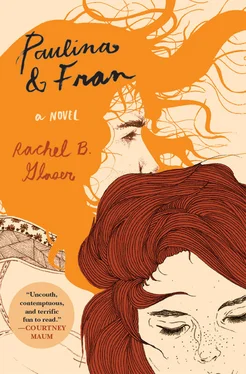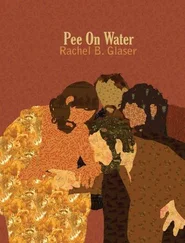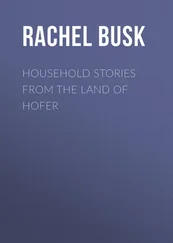Aweek later, they all graduated in faux silk, then, like trash in the water, floated off to lousy jobs in obscure towns and heartless cities. Terrible things happened in the news. People killed one another in inventive ways, and Fran read about it guiltily, as if her interest promoted it.
Fran hadn’t expected to move to Upstate New York, but it was satisfying to paint houses. It felt human to trust ladders. It was the only job that responded. She’d gotten the call the same day she applied, and had accepted the offer before finding Hudson on a map. She’d be in nature! Or near nature.
She slept in the extra room of an old woman’s house. The room had two windows, a small closet, and a sooty fireplace where spiders traveled long distances to die. Fran used the fireplace as an altar for her one love letter from Julian and a student evaluation from Sampson. She looked to these little papers in the dark, evidence that she could impress people.
When Ruthie had showed her the house, Fran was so charmed by her quick wit and wise eyes that she hadn’t looked at the other apartments on her list. Fran imagined the old woman telling her life story over glasses of wine. Fran saw herself spiritually reviving the old woman, perhaps somehow encouraging a love affair between Ruthie and an old (but handsome) mailman or neighbor, and this successful union would be so emotionally satisfying that Fran wouldn’t mind being single herself, having done this good deed. These fantasies vanished once Fran moved in. It seemed Ruthie had saved all her energy and good spirits for that first meeting and now she returned to her normal state of reading the newspaper and forgetting she had water boiling. Nights, Ruthie slept in front of the television surrounded by a haunted civilization of dolls, figurines, and fake flowers.
As Fran tiptoed around Ruthie, she thought of her fellow graduates trying new drugs, seeing old bands, taking the road trip people took from one part of California to another. Weekends she took herself to the local bar, Gruff’s, dressed like she was still at school, waiting to be discovered. If Paulina were here she thought, we’d make friends with the old men playing Hearts, we’d flood the jukebox with Bowie and buy each other weird drinks — but Paulina had left her in the bathroom.
At the Lanfers’ house, which they were painting a very dark blue, she threw the tarp off the ladder and sat waiting for the others. The company was run by an angry old man. The other painters were men in their thirties and forties. They smoked and had tanned, worn skin. On break they all ate sandwiches in the shade. It felt very American to Fran.
She spoiled good days calling Julian’s old number and hearing the robot woman’s voice— the number you are trying to reach is no longer in service, please try again. Only I could be jealous of a computer’s voice, she thought. She had no one to talk to. She was friends with Allen and Pete at work, but they didn’t hang out. No one went to the farmer’s market with her. She walked there herself.
At school she’d seen herself as special, but in the weeks since graduation the world had slowed and now it was clear that everyone was as insignificant as the scrappy backyards one passes on trains. Forget style or talent; now it seemed the best thing a person could have was a house. One bought a house and then chose a color. The first house Fran helped paint was purplish gray, a ghostly, nuanced color. A woman on Franklin Avenue picked a fiery orange. One chose a color and a lover. One found a lover and trapped them with love.
“Are you coming?” Gretchen asked, her familiar voice breaking through the cocoon of Fran’s new life — the faint crackling of a record at the end of its side, a foreboding smell that filled the kitchen whenever Fran or Ruthie opened the fridge.
“That’s why I’m calling,” Fran said. “I can’t. I paint too slow. I have to work today.”
“But it’s a holiday!”
“I know. I can hear firecrackers down the street. But I gotta go to the Lanfers’.” Fran wondered if Gretchen was mad. A box fan blew from her window. “The guys I paint with call me Snail,” she said. “Isn’t that cute?” Talking to Gretchen, new Brooklyn Gretchen, Fran had to root hard for herself, convince herself that she was the interesting one, she was the artist. Julian had loved her, might still love her. She could hear people where Gretchen was, people laughing. “Where are you?”
“I’m at the party. I’m on some guy’s roof. Some guy James knows. It’s really fun. People are comparing tattoos. A bunch of kids from school are going to come by later.”
Fran looked out her bedroom window where Ruthie was watering the plants with a big rusted can. “What do you even do out there?” Fran asked, knowing.
“Branding. Web design.” There was a long pause in which Fran could hear a female voice calling plaintively for ice. “Are you making paintings?” Gretchen asked.
“Tons,” Fran said, looking at her blank wall. Nights she lay on her futon, daring herself to paint, afraid the painting would be bad. “There’s an old barn where they let me paint.” This sounded plausible but wasn’t true. Fran could hear Gretchen talking to someone. “Who is that?” she asked. “Someone from school?”
“It’s hard to hear you. It’s really crazy here. Everyone’s been drinking all day. Just move here. You can stay with me until you get a job. We’ll hang out. We’ll have fun.” Fran heard music and more talking on Gretchen’s end. It sounded like Gretchen had grown prettier to the world. Fran pressed Ruthie’s landline receiver to her face. It smelled like saliva from the eighties.
“Well, thanks. I might do that sometime. But I don’t like crowds. Plus Paulina,” Fran said. “I don’t want to see her.”
“I haven’t run into her once,” Gretchen said, losing patience. “New York isn’t the size of a room.”
“Remember when you hated Paulina?”
“I overreacted,” Gretchen said. “I didn’t like being mad at Andrew, so I took it out on her.”
Gretchen itched to get off the phone. Freshman year, Fran had been the loveliest, most interesting person Gretchen had ever met. They used to lie on the grass and Fran would captivate her with stories and non sequiturs. Now she sounded more like a runaway teen than a promising artist.
“You talked about her endlessly!” Fran exclaimed.
“Yeah, but I got over it.”
There was so long a pause that Fran wondered if Gretchen had forgotten about her.
“Did you ever remember your e-mail password?” Gretchen asked suddenly.
“Yes, and I wrote it down. But I still don’t own a computer.”
The Internet isn’t just a fad, you know, Gretchen had once told her in the Computer Lab. Now she just said, “Okay, well, gotta go, talk soon, bye.”
Fran daydreamed about the party (audacious colors, music dug up from a time capsule). She imagined moving to New York, walking with Gretchen, some man running into her and her slides falling on the ground, the man holding them up to the light. .
Fran’s paintings show a wonderful mastery of color, light, and form. This semester’s work benefited from her decision to stop painting from photographs, and instead draw from the vivid pictures in her mind. The result is a brilliant skewing. In these pieces, life is slanted and disproportionate. Humans look demonic and unreal. Without details to copy, Fran’s lines and washes render emotions through texture. The color palette is completely unexpected. Should she continue in this path, she will find herself far beyond her original skills.
She could recite it. She stood in the shower washing the paint from her skin, thinking, The result is a brilliant skewing. At her desk, Fran sketched the faces of the house painters she spent her days with, but the drawings looked cartoonish. She scribbled over them with her expensive art pencil. She smoked the wimpy clump of weed she’d bought off Allen and lay down on the floor.
Читать дальше












